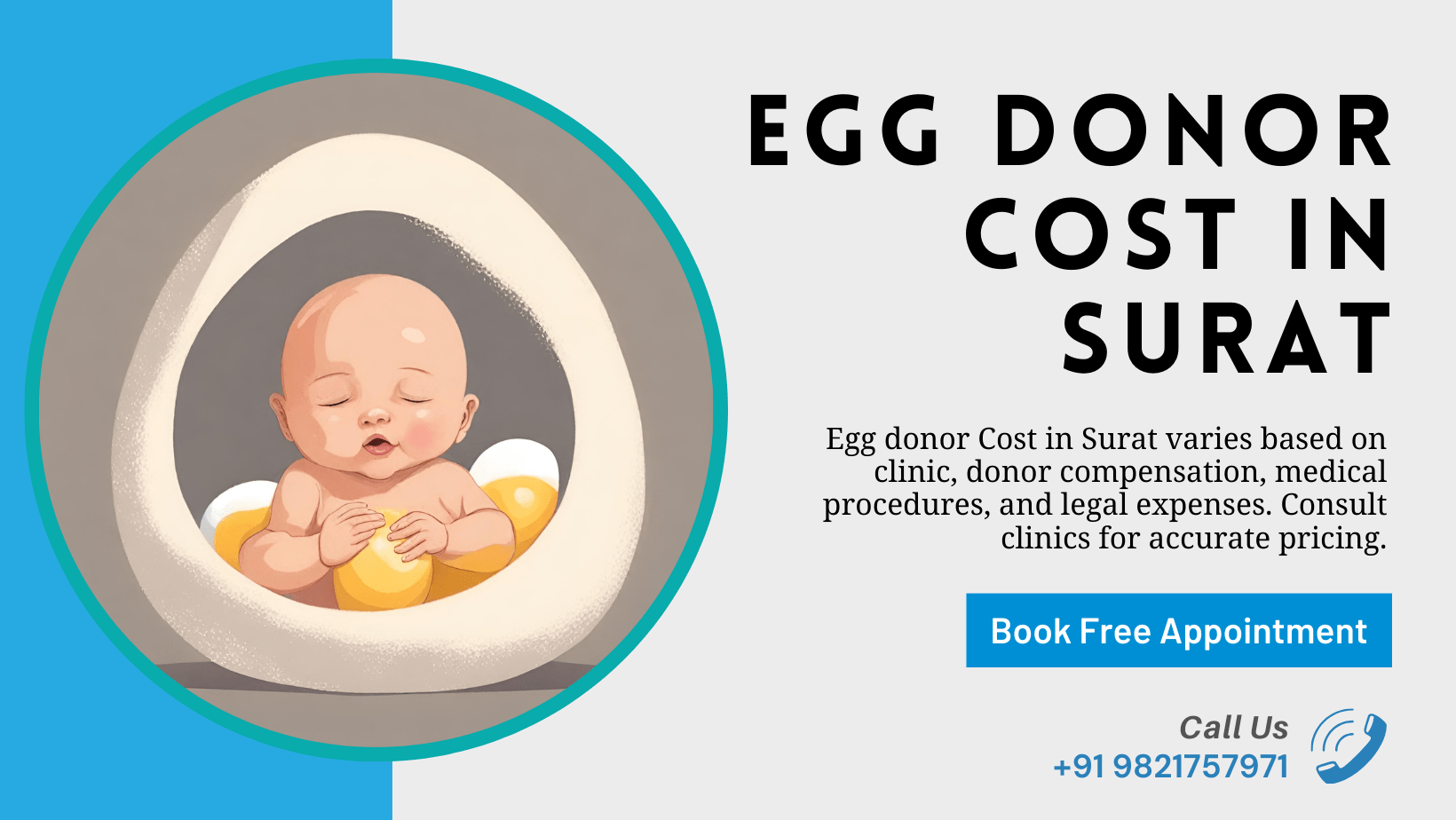Looking to navigate the realm of fertility treatments in Surat? Understanding the costs associated with egg donation is crucial for those exploring this option. In Surat, a vibrant city known for its medical advancements, the Egg Donor Cost in Surat varies based on several factors. From clinic to clinic, prices may fluctuate due to the donor’s profile, medical screening, and additional services provided.
Egg donation offers hope to individuals and couples struggling with infertility, providing an opportunity to fulfill their dreams of parenthood. However, it’s essential to be well-informed about the financial aspects involved. By delving into the specifics of Egg Donor Price in Surat, prospective parents can make informed decisions about their fertility journey.
This introduction aims to shed light on the Egg Donor Cost in Surat, serving as a resource for those embarking on this path. Whether you’re just beginning your research or ready to take the next step, understanding the financial considerations is the first step toward realizing your dreams of starting or expanding your family.
What is Egg Donor?
Egg Donor involves the process of a woman, known as the donor, providing her eggs to be used in assisted reproductive procedures, such as in vitro fertilization (IVF). These donated eggs are then fertilized with sperm in a laboratory setting, and the resulting embryos are transferred to the uterus of another woman, known as the recipient, who is unable to conceive using her own eggs. Egg donation offers hope to individuals and couples struggling with infertility or genetic disorders that may be passed on through their own eggs.
Importance of Egg Donor
Egg Donor plays a crucial role in helping individuals and couples achieve their dreams of having a child. For many people facing infertility challenges, using donated eggs can be their only chance of experiencing pregnancy and childbirth. Additionally, egg donation allows individuals with certain genetic conditions to have biological children without passing on hereditary diseases to future generations. Overall, egg Donor provides hope, possibility, and the opportunity for parenthood to those who may have otherwise been unable to conceive.
Overview of Egg Donor Process
The overview of the egg donor process entails a comprehensive understanding of the various stages involved in egg donation, from initial screening to embryo transfer.
- Donor Selection: The process begins with the selection of a suitable egg donor, often facilitated by the fertility clinic or agency. Donors may be chosen based on factors such as age, health history, genetic background, and physical characteristics.
- Medical and Psychological Screening: Once a donor is selected, she undergoes rigorous medical and psychological screening to ensure her overall health, fertility, and mental well-being. These evaluations help identify any potential risks or concerns and ensure the donor’s suitability for the donation process.
- Ovarian Stimulation: Following successful screening, the donor undergoes ovarian stimulation, a process involving the administration of hormonal medications to stimulate the ovaries to produce multiple eggs. This typically lasts for about 10-14 days and is closely monitored by medical professionals through regular ultrasound scans and blood tests.
- Egg Retrieval: Once the eggs reach optimal maturity, they are retrieved from the donor’s ovaries through a minor surgical procedure called transvaginal ultrasound-guided egg retrieval. The procedure is performed under sedation or anesthesia to ensure the donor’s comfort and safety.
- Fertilization and Embryo Development: The retrieved eggs are then fertilized with sperm from either the recipient’s partner or a donor in the laboratory. After fertilization, the embryos are cultured and monitored for several days to allow them to develop and reach the appropriate stage for transfer.
- Embryo Transfer: Once the embryos reach the desired stage of development, one or more embryos are transferred into the recipient’s uterus through a minimally invasive procedure. This typically occurs 3-5 days after egg retrieval and may involve the use of ultrasound guidance for accuracy.
- Post-Transfer Care and Monitoring: Following embryo transfer, the recipient undergoes a period of rest and observation to increase the chances of successful implantation. The recipient may be prescribed medications to support embryo implantation and pregnancy.
- Pregnancy Testing and Follow-Up: Approximately two weeks after embryo transfer, the recipient undergoes a pregnancy test to determine if implantation has occurred. If the test is positive, the recipient continues with regular prenatal care, while if it’s negative, further discussions and evaluations may be needed to explore next steps.
Why Surat for Egg Donor?
Surat, a city in Gujarat, India, has emerged as a popular destination for egg Donor due to several factors. Firstly, Surat is home to numerous reputable fertility clinics and medical professionals who specialize in assisted reproductive technologies, including egg Donor. These clinics offer state-of-the-art facilities, experienced staff, and high success rates, attracting patients from across the country and around the world. Additionally, Surat boasts a relatively lower cost of living compared to other metropolitan cities, making it a more affordable option for individuals seeking fertility treatments. Furthermore, Surat is known for its warm hospitality and cultural diversity, providing a supportive and welcoming environment for individuals embarking on their fertility journey. Overall, Surat offers a combination of quality medical care, affordability, and comfort, making it an ideal destination for egg donation.
Get Free Consultation
Understanding Egg Donor Cost
Understanding Egg Donor Cost involves considering various factors such as donor compensation, agency fees, medical screening, and legal expenses. Transparency and guidance from fertility experts help navigate this aspect of the fertility journey effectively.
Factors Affecting Egg Donor Cost
- Clinic Reputation and Location: The reputation and location of the clinic play a crucial role in determining the cost of egg donation. Clinics with a strong reputation for success and expertise often charge higher fees, especially if they are located in metropolitan areas with higher living costs. Conversely, clinics in more rural or less affluent areas may offer lower costs.
- Donor Screening and Compensation: Extensive donor screening processes, including medical, genetic, and psychological evaluations, contribute to the overall cost. Donors are compensated for their time, effort, and any potential risks associated with the donation process. Compensation amounts vary but are typically commensurate with the inconvenience and commitment required.
- Medical Procedures and Medications: The cost of medical procedures and medications is a significant factor in egg donor cost. This includes expenses related to ovarian stimulation medications, monitoring appointments, and the surgical procedure for egg retrieval. The complexity of the medical protocol and the dosage of medications required can impact the overall cost.
- Legal and Administrative Fees: Legal and administrative fees cover the contractual and regulatory aspects of egg donation. This includes legal consultations, drafting contracts, and administrative tasks associated with managing the donation process. These fees ensure that all parties involved are protected and that the process adheres to legal and ethical guidelines.
Typical Range of Egg Donor Costs
The cost of egg donation varies widely, but typically ranges from several thousand to tens of thousands of dollars. This range encompasses expenses related to donor screening, medical procedures, medications, clinic fees, and legal and administrative costs. The total cost may also include additional expenses such as travel and accommodation for both the donor and recipient.
Cost Breakdown: What You’re Paying For
Understanding the breakdown of egg donor costs is essential for individuals and couples considering this option. Donor compensation accounts for a significant portion of the total cost and reflects the compensation provided to the donor for their time, effort, and any associated risks. Medical expenses include the costs of ovarian stimulation medications, monitoring appointments, and the surgical procedure for egg retrieval. Clinic fees cover overhead costs, including staff salaries, facility maintenance, and equipment expenses. Legal and administrative fees encompass the costs of legal consultations, contract drafting, and administrative tasks involved in managing the egg donation process. By understanding these components, individuals can make informed decisions and budget effectively for their fertility journey.
Egg Donor Cost in Surat
Explore offering eggs for donation in Surat. The cost normally ranges between INR 80,000 and INR 150,000, depending on the clinic’s repute, donor qualities, and other procedures. This expense covers medical assessments, donor compensation, clinic fees, and legal formalities. Clinics often offer comprehensive packages inclusive of screening tests for both the donor and the recipient, ensuring compatibility and safety. Planned guardians ought to research and contrast various centers with figure out the breakdown of expenses and accessible administrations. Numerous facilities give funding choices or installment intends to facilitate the monetary weight. Understanding the egg donor cost in Surat empowers individuals to make informed decisions about their journey to parenthood.
Understanding the Egg Retrieval Process
- Step-by-Step Overview: The egg retrieval process is a crucial step in egg donation and typically involves several key stages. First, the donor undergoes ovarian stimulation using hormone medications to encourage the development of multiple mature eggs within the ovaries. When the eggs arrive at ideal development, a transvaginal ultrasound-directed desire technique is performed, where a needle is embedded through the vaginal wall to get to the ovaries and recover the eggs. The retrieved eggs are then immediately transported to the laboratory for fertilization with sperm.
- Potential Risks and Complications: While the egg retrieval process is generally safe, there are potential risks and complications associated with the procedure. These may include bleeding, infection, injury to surrounding organs, and adverse reactions to anesthesia. Ovarian hyperstimulation syndrome (OHSS) is a rare but serious complication characterized by fluid accumulation in the abdomen and chest, which can cause abdominal pain, bloating, nausea, and shortness of breath. Additionally, there is a slight risk of damage to the ovaries or a decrease in ovarian function following repeated egg retrievals.
- Recovery and Aftercare: Following the egg retrieval procedure, donors are typically monitored for a brief period in a recovery area to ensure their safety and well-being. Most givers can hope to encounter some distress, bulging, and squeezing soon after the technique, which can be made do with over-the-counter pain killers and rest. It is essential for donors to follow post-retrieval instructions provided by their healthcare provider, including avoiding strenuous activity, refraining from sexual intercourse, and attending follow-up appointments as scheduled. Contributors are urged to remain hydrated and eat a sound eating routine to help their recuperation cycle. Additionally, donors may experience emotional responses to the procedure and are encouraged to seek support from friends, family, or mental health professionals if needed.
Post-Retrieval Follow-Up and Support
Monitoring and Follow-Up Visits: After the egg retrieval procedure, donors are typically scheduled for follow-up visits to monitor their recovery and ensure there are no complications. These subsequent visits might incorporate actual assessments, blood tests, and ultrasounds to evaluate ovarian capability and by and large wellbeing. Donors are encouraged to report any unusual symptoms or concerns to their healthcare provider promptly.
Emotional and Physical Recovery Support: Emotional and physical recovery support is essential for egg donors after the retrieval procedure. Donors may experience a range of emotions, including relief, sadness, or anxiety, and it’s essential to have access to support resources such as counseling services or support groups. Also, givers might profit from actual recuperation support, remembering direction for overseeing distress, dietary proposals, and ideas for continuously continuing typical exercises.
Long-Term Health Monitoring: Long-term health monitoring is crucial for egg donors to ensure their well-being beyond the immediate recovery period. While egg donation is usually regarded as safe, long-term research on the possible health implications are lacking, and donors may be recommended to have frequent health exams and assessments, especially if they intend to give many times or have concerns about their reproductive health. Monitoring may include assessments of ovarian function, hormone levels, and overall reproductive health.
Legal and Ethical Considerations
Legal Rights and Responsibilities of Donors and Recipients: Egg donation involves complex legal considerations regarding the rights and responsibilities of both donors and recipients. Legal arrangements framing the details of the gift, including monetary pay, classification, and parental freedoms, are ordinarily drafted to safeguard all gatherings included. Donors and recipients should seek legal counsel to ensure they fully understand their rights and obligations before proceeding with egg donation.
Ethical Guidelines for Egg Donation: Ethical guidelines for egg donation emphasize the importance of informed consent, autonomy, and respect for the well-being of donors and recipients. These rules frame standards, for example, non-pressure, secrecy, and straightforwardness all through the gift cycle. Donors and recipients should be provided with comprehensive information about the risks, benefits, and alternatives to egg donation to make informed decisions about their involvement.
Understanding Consent and Confidentiality: Consent and confidentiality are paramount in egg donation to protect the privacy and autonomy of donors and recipients. Donors must give their free and informed agreement to engage in the donation procedure, acknowledging the possible dangers and ramifications. Confidentiality safeguards are in place to protect donors’ and recipients’ identities, preserving their privacy throughout and after the donation procedure. Clear communication and documentation of consent and confidentiality protocols are essential to uphold ethical standards in egg donation.
Conclusion
In conclusion, understanding the cost of egg donation in Surat is a vital step for individuals and couples embarking on their fertility journey. The comprehensive overview provided in the blog article sheds light on the various factors influencing egg donor costs, including clinic reputation, medical procedures, and legal considerations. By grasping the intricacies of egg donation costs, readers can make informed decisions tailored to their unique circumstances. Moreover, the article highlights the importance of post-retrieval support and long-term health monitoring for egg donors, emphasizing the holistic approach taken by reputable clinics like Baby grow Fertility in Surat. Overall, this insightful resource serves as a valuable guide for navigating the complexities of egg donation with confidence and clarity.




